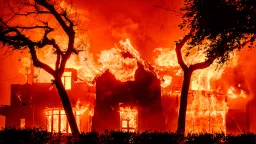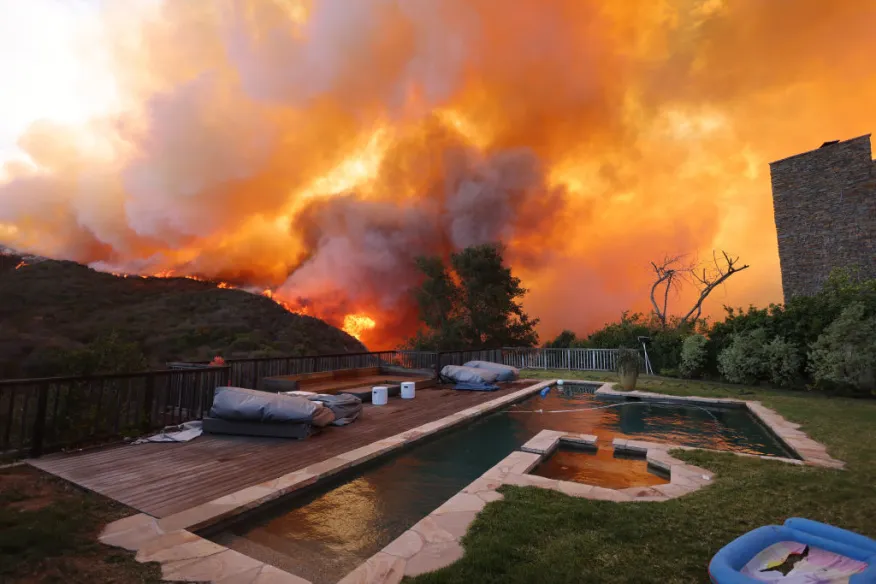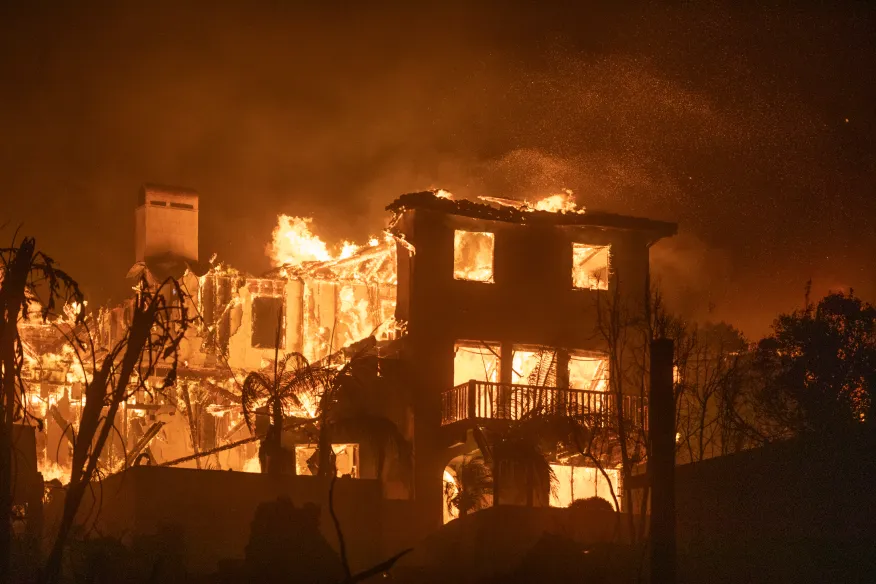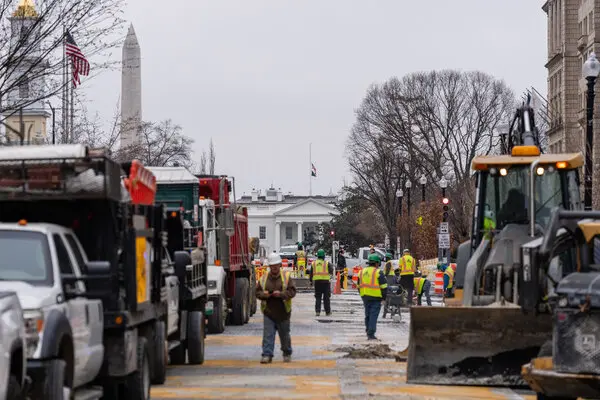
- File a claim with your insurance company as soon as possible
- Document everything, including conversations with your insurer
- Don’t throw away damaged items until you get the OK to do so

As wildfires continue to burn across the Los Angeles area, thousands of people are expected to start the lengthy insurance claims process to recoup their losses.
AccuWeather has raised its initial estimate, now pegging the total damage and economic loss between $250 billion and $275 billion. That would make the Los Angeles-area wildfires among the most expensive natural disasters in recent U.S. history.
Assessments are ongoing, but the California Department of Forestry and Fire Protection estimates more than 12,000 structures may have been damaged or destroyed in the Palisades and Eaton fires.
A wildfire property claim can take months, sometimes years, to resolve, so those with insurance should start by filing a claim as soon as possible.
“We highly recommend people get in touch with their insurance company right away. Don’t put that off. Get your claim in,” said Janet Ruiz, strategic communications director at the Insurance Information Institute, an industry trade group.
These days, many insurers have mobile apps where you can file a claim; otherwise, you can call your agent directly. Be sure to compile as much documentation as you can to get the maximum payout.
“Take notes on every conversation you have with your insurance company,” Ruiz said. “It’s a very disturbing time and it’s hard to remember all the details.”
Coverage limits and specifics vary depending on your insurance policy, but here’s what homeowners should do — and not do — after a wildfire.

Do: Get a copy of your homeowner’s insurance policy
Make sure you read and understand your insurance policy. If you don’t have a copy, ask your insurance provider. The law requires your insurance company to provide this free of charge within 30 days of your request.
When it comes to wildfires, there are three main coverage areas to pay attention to:
- Coverage for the structure of your home: A standard homeowner’s policy covers destruction and damage caused by fire. That means your insurance company will pay to rebuild or repair your home, including smoke damage.
- Coverage for personal belongings: Items like furniture and clothes are covered if they are destroyed by fire. Insurance also covers stolen items in the event of looting, which has been reported in the LA area.
- Most companies provide personal property coverage that falls between 50% and 70% of the amount of insurance on the structure of a home, according to the Insurance Information Institute.
- Coverage for additional living expenses (ALE): If your home is uninhabitable, your insurance will typically pay for the costs of living away from home — expenses like hotel bills, restaurant meals and other necessary costs.
- You have at least 24 months to collect ALE after a declared catastrophe, even if your policy says otherwise, according to the California Department of Insurance.
- ALE coverage is usually around 20% to 30% of your dwelling coverage, according to Bankrate. So if your home is insured for $200,000, your ALE coverage would be between $40,000 and $60,000.
Your insurance may also cover damage to fencing, outbuildings and landscaping, so it’s important to understand your specific policy.
In California, property insurers must immediately pay out a minimum of one-third of the estimated value of a policyholder’s personal belongings and a minimum of four months’ worth of rent for the local area in which they live.
Do: Document everything
Gather as much information as you can to support your claim. Once it’s safe to do so, take detailed photographs of all the damaged areas, including close-ups and wide shots.
Create a detailed inventory of everything that was in your home. Write down item descriptions such as the brand, model, color and size. Start compiling receipts and warranties if you have them. It can also be helpful to go through old pictures and videos to show what you had in your house.
The more information you have, the faster your claim can be settled.
A home inventory is a good idea for anyone, especially if you live in a disaster-prone area.
“Open all the cupboards, open all the closet doors. Go through your garage,” Ruiz said. “These are all the things that people really have a hard time itemizing after a loss.”
A 2023 Insurance Information Institute survey found that fewer than half of homeowners (47%) had prepared personal inventories to document their losses.
Those who have been forced to relocate should track all of their expenses, such as hotel and food costs.
It’s also important to document all conversations related to your claim. The California Department of Insurance recommends starting a “claim diary” and keeping a detailed record of calls with your insurance company, contractors and anyone else connected to your claim.
Write down who you talked to, when you talked to them, any agreements that were made and a general summary of the conversation.

Don’t: Throw away damaged items prematurely
It can be tempting to clear out the damage as quickly as possible, but you should hold off until the insurer says it’s OK.
An adjuster, who is professionally trained to assess the damage, will visit the property and determine how much the company should pay. Don’t throw out any damaged items or make permanent repairs until the site is inspected.
Once you get the go-ahead to remove debris and make temporary repairs, Ruiz said it’s best to use a licensed contractor to avoid getting ripped off.
“There’s scam artists out there who we see preying on people taking their money, not doing the work,” she said. “Don’t use unlicensed contractors for any of the work.”
You can call the Contractors State License Board (CSLB) at 1-800-321-2752 to check if a contractor’s license is valid or visit the website at cslb.ca.gov for more information.
Other tips to avoid being scammed when hiring a contractor, according to the California Insurance Department:
- Be especially suspicious of door-to-door salespeople who make unrealistically low estimates, refuse to leave a contract overnight, or try to sell their services by playing on your emotions.
- Never sign a contract with blank spaces that have not been filled in.
- Pay by check instead of cash, so you can retain your cashed check as a receipt.
- Hire local licensed contractors when possible, as it is easier to deal with a local contractor if problems develop.
Don’t: Be afraid to seek out help
Dealing with an insurance claim can feel daunting. Policies are notoriously complicated, often full of legal jargon and technical terms that mean nothing to the average person.
Ruiz said people tend to have a better experience when they work with their insurance company, instead of treating the process like a fight.
“Ask a lot of questions: What are my limits? How do I go through this process? What do I do next?” she said.
Ruiz added: “Don’t think of it as a battle. Think of it as a negotiation.”
Los Angeles County residents who have been impacted by recent wildfires can also attend free workshops next week to help them navigate the process.
Experts from the Department of Insurance will be available for one-on-one consultations to address specific concerns. You can schedule an appointment by calling the California Department of Insurance Hotline at 1-800-927-4357. Walk-ins will be helped on a first-come, first-served basis.
The schedule for next week’s workshops:
- Santa Monica:
Saturday, Jan. 18, 10 a.m. – 5 p.m.
Sunday, Jan. 19, 10 a.m. – 1 p.m.
Santa Monica College Performing Arts Center East Wing
1310 11th St. in Santa Monica - Pasadena:
Saturday, Jan. 25, 10 a.m. – 5 p.m.
Sunday, Jan. 26, 10 a.m. – 1 p.m.
Pasadena City College
1570 E. Colorado Blvd. in Pasadena
Find more tips for wildfire claimants in California here.



